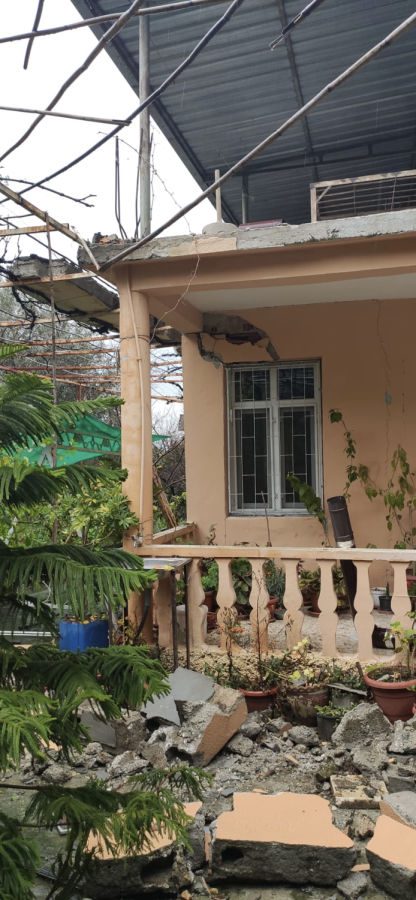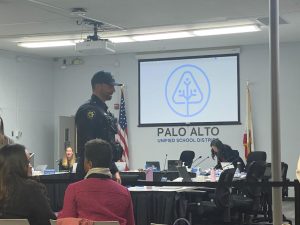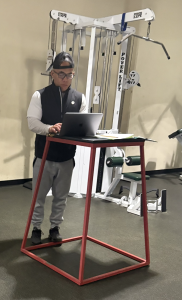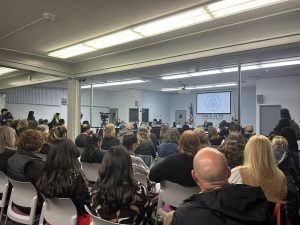Students worry about family and friends impacted by the Turkey-Syria earthquake
A house sits amid the rubble of crumbled walls and ceilings caused by one of the earthquake’s aftershocks last Wednesday in Adana, Turkey. Several students at Palo Alto High School say they believe that the Turkish government could have improved and enforced building codes towards preventing the severe, long-term damage of the natural disaster. One student in particular is junior Sarp Kendirli, who said it has been hard for him to watch his homeland suffer from the effects of the seismic activity. “Watching it on the news, seeing it on the television, it’s hard seeing the people of my country suffer in such devastating circumstances,” Kendirli said. “But what hurts more is the mismanagement that has been seen throughout this event by the government that has led to the most loss of lives. The disorganized response has left many under rubble for days throughout the cold, below-freezing nights that Turkey has right now.” (Photo: Source name withheld, via Sarp Kendirli)
February 12, 2023
Students with roots in the Middle East are expressing concern and sending heartfelt wishes for their friends and family in Turkey and Syria after a 7.8 magnitude earthquake and its aftershocks struck regions early morning in local time on Monday last week.
The earthquake damaged thousands of buildings in Turkey and took a total of over 28,000 lives in both Turkey and Syria, according to the Associated Press.
Junior Sarp Kendirli, who grew up in Turkey, said he had close friends living in Adana, a town ravaged by the earthquake. Kendirli said it has been challenging for him to get in touch with friends.
“I don’t really know much of their situation because the communication lines and the telephone lines are all down,” Kendirli said. “Even if they are safe, it’s very hard for people to contact their friends and family. In my case, I haven’t been able to contact friends I’ve had from middle or elementary school that live in the area since what happened on Monday.”
Sophomore Lara Dumanli also has extended family and close friends living in Istanbul, Turkey. While they were not severely affected, Dumanli is still concerned for the people living in the towns that were directly hit in Adana and Gaziantep.
“We have family and friends all over [Turkey],” Dumanli said. “So even if you’re not directly impacted, in a sense, you are still [impacted].”
Dumanli said she finds it hard watching her homeland and its people suffer from the earthquake.
“Overall, I think it’s just a heartbreaking situation,” Dumanli said. “Every couple of years, a horrible natural disaster event really shows how much it [Turkey] needs help. Not only Turkey, but Syria as well.”
Junior Anna Ghereghlou, whose dad’s family is from Turkey, is also saddened by the seismic damage. While her family’s friends only felt tremors from the quake and were not largely affected, she still sympathizes with those who have lost family members and their homes.
“It [the earthquake] was very large and very unfortunate for everybody that was hurt that faced it,” Ghereghlou said. “Some thousands are dead and several injured, which is very unfortunate and very sad. I don’t think anybody was expecting an earthquake this large to hit Turkey.”
Although this is not the first earthquake Turkey has faced, as the country lies on two major fault zones, the recent seismic event was even more long-lasting and intense than a typical quake.
“Usually, earthquakes in Turkey aren’t much to worry about,” Ghereghlou said. “They happen. People recover easily, but this one really made everybody have to step back and look at the situation.”
In terms of helping the community of those who have suffered, Kendirli hopes that the Bay Area and those in the Paly community will still be able to make a difference in improving the situation in Turkey.
“Our prayers and our thoughts are with them,” Kendirli said. “But for those who haven’t been affected, for those of us who are here safe, I would encourage all of us to do all they can to donate goods and supplies. Donating money, some amount that you feel comfortable with, has a great impact on helping the efforts going on in Turkey and Syria to combat the earthquake.”
Kendirli said he believes the Turkish government could have prepared a better plan to regulate the damage done across the nation.
“The part that hurts the most about this earthquake was that it [the damage] was preventable,” Kendirli said. “But the government hasn’t done much in the past decades, or even centuries, to prevent such occurrences.”
Dumanli has a similar view, saying that if the Turkish government had provided more resources towards preparing and protecting citizens, the earthquake might not have taken so many lives. Dumanli expressed concern for the people still trapped under toppled buildings and still in need of rescue.
“Turkey isn’t a very developed country, as many of the cities have [a] bad infrastructure,” Dumanli said. “I don’t think the government was going to get them [the victims] through this; even now, there’s still people underneath the rubble because the government hasn’t brought in the proper resources.”
This earthquake was also a call for change in the Turkish government, according to Dumanli.
“It honestly shows how absolutely heartbreaking it is, because Turkey is often forgotten as [being] in the Middle East, and what we go through is scary,” Dumanli said. “It’s horrible, and it makes me mad and angry. A lot of times when these events happen in other places, immediate relief comes in, but it took so many people hours to come.”
Kendirli said that the Turkish government should do more to address this issue to prevent future tragic events from happening.
“Putting more regulations around how buildings are built, to make them more earthquake-resistant, making plans to respond effectively in such a disaster, or educating the public or children in schools on what to do during an earthquake – I think those are very effective measures,” Kendirli said.
Although most students don’t have close family members severely impacted by the earthquake, Ghereghlou said she wishes for the victims to heal from the devastating event.
“I just really hope for a speedy recovery,” Ghereghlou said. “I hope to get some people to rebound from this, somehow, by finding the good and working together as a community to fix what’s been broken down. I think that’s what people are looking for now.”








